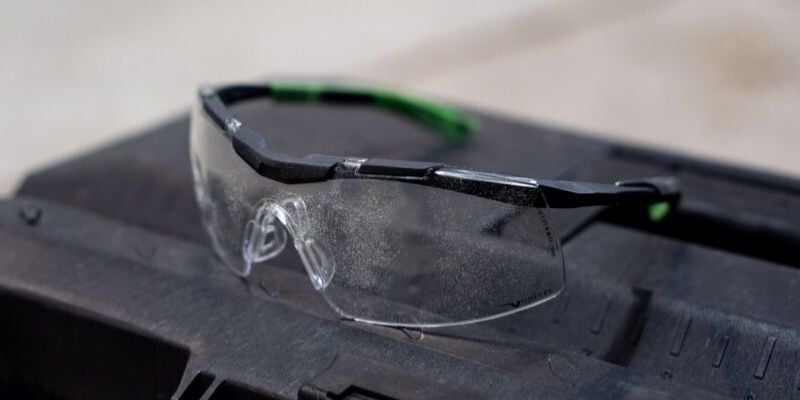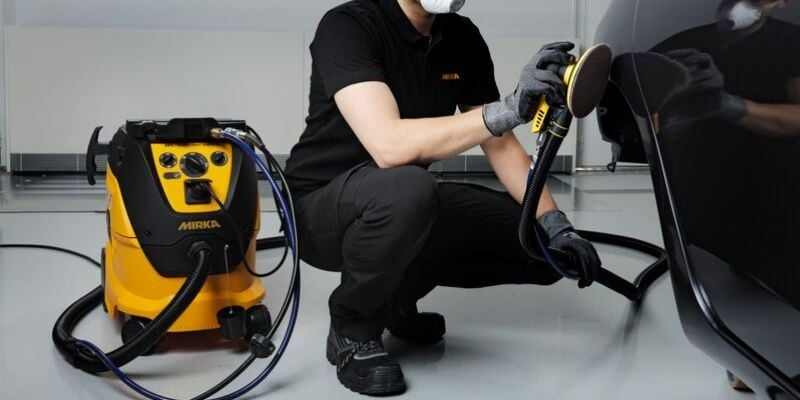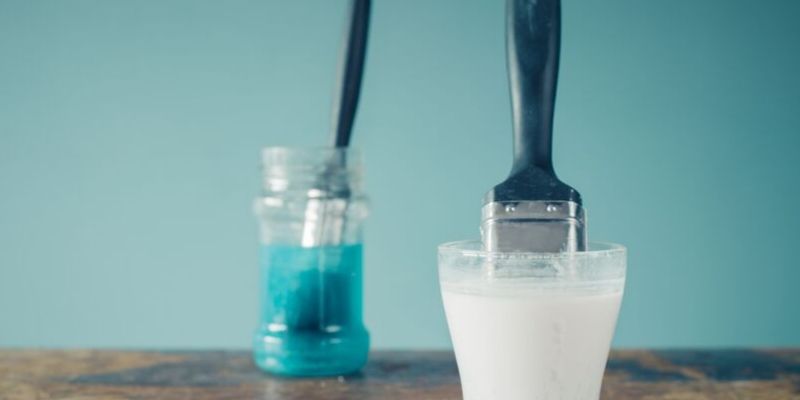Why you need to stop buying cheap safety glasses

Safety glasses are an essential piece of PPE when carrying out any work that involves machinery or equipment. But do you fully understand eye protection or do you just grab the cheapest ones you can find?
Have you ever spent the day on site constantly taking your safety glasses on an off either because they are uncomfortable, are giving you a headache or they keep steaming up? If the answer is yes, then this could be down to the quality of your glasses themselves as a good pair of safety glasses should allow you to wear them all day without even realising that you've got them on.
First things first
Before you buy any safety eyewear you need to understand the markings that are printed or etched onto the glasses. All safety eyewear is marked both on the lens and on the frame to indicate the level of protection offered by the eyewear. We have created an example of the markings you would find on a pair of protective spectacles below. These markings indicate what safety standard and properties the glasses conform to.

The table below references the markings seen on the glasses shown above. These can then be referenced to the Univet Safety Marking reference guide to help understand what they mean.
Scale Number - Indicates the shade level of the lens
Mechanical Resistance - Indicates the lens ability to resist impact
Optional Requirements - Indicates the additional properties such as anti-fog
| Scale Number | Manufacturer | Optical Class | Mechanical Resistance | Optional Requirement | |
|---|---|---|---|---|---|
| 5-3.1 | 3M | 1 | FT | CE |
You can download the Univet Safety Marking reference guide here.
EN Markings
The first thing to check is that they have an 'EN' marking. This marking indicates that the eyewear has been tested and certified officially by a recognised European Notified Body.
EN166 - Personal eye-protection specifications
This marking is the minimum for any set of safety glasses or goggles and indicates that they are certified for eye protection.
EN175 - Equipment for eye and face protection during welding and allied processes
This indicates that the equipment is suitable for welding
So now let's look into what causes these problems and how they can be addressed.
Issue 1: Your glasses give you a headache.
The problem with many low-cost safety glasses and goggles is that the lenses are quite simply a curved piece of clear plastic cut into the shape of a lens. The problem with this is that when you curve a piece of clear plastic it distorts the view through it. This means that your eyes have to work harder to try and correct the distortion in the lens, this causes strain on your eyes that usually results in a headache.
When buying safety eyewear the first thing to look for is that they have an optical class of 1. This will usually be written in the product description, certain brands such as Univet also laser etch the code on the lens as shown in the image and table above.
Issue 2: Your glasses are uncomfortable to wear
This discomfort is usually felt on the nose where they rest. This issue is mainly down to the design and adjustability of the product. Many glasses have hard nose pieces that can dig into the bridge of your nose whilst you're working, also they can begin to slip down your nose as you sweat. High-quality glasses such as the Univet 506U have features such as Softpad Technology and adjustable arms. This technology provides a soft and adjustable nose piece that will flex to the shape of your nose and will prevent slipping whilst working. These extra details make for a secure fit that helps to make the glasses more comfortable to wear.
Issue 3: They steam up whilst wearing them
We've all been there, you're mid-cut or halfway up a ladder and your glasses steam up so you can't see a thing. It never happens at a good time, in reality, it doesn't have to happen at all. If you choose a pair of glasses with anti-fog lenses then steamed up glasses are a thing of the past. Be aware though, not all anti-fog glasses are equal, it's all about how and where the anti-fog coating is applied.
Anti-fog coatings - The science bit
The lenses of your protective glasses or goggles steam up due to condensation that is produced by the heat from your face hitting the cooler surface of the lens. In order to prevent this, manufacturers apply a coating to the lenses, this is where it gets interesting though. In order to be officially certified as 'anti-fog' the lenses must have a rating of 'N', this means that the lenses are rated for Resistance to fogging of oculars.
Some anti-fog coatings are applied as a very thin coating that is sprayed onto the lens and will eventually be rubbed off when you wipe the glasses to clean them. More advanced coatings like the Vanguard UDC coating from Univet are baked onto the lens to prevent it from being removed by the rigours of working on site, this coating also guarantees anti-fog properties.
Issue 4: Your glasses get scratched
Again this is a trait of lower cost glasses. Higher quality glasses such as the 5X6 from Univet have a hard wearing anti-scratch coating that prevents abrasions from scratching the lenses, however, this doesn't mean you can throw them around your van and expect them not to get scratched, it does have limits.
Depending on the glasses you choose the coatings do differ. Some glasses will have the anti-scratch coating applied only to the outside of the lens, better quality glasses will have the coating applied to both the inside and outside of the lens making for a much more durable pair of glasses.
You can see more about the Univet Vanguard coating below
More features doesn't mean more expensive
All of these features may sound expensive but the reality is you can pick up a good pair of anti-fog safety glasses for less the £5. Your eyes are one of the most important tools that you have so make sure you look after them, don't compromise on safety and quality for the sake of a pair of glasses that cost the same as a pint of beer.
You can shop our full range of safety glasses and goggles online here, or if you need any more information or advice on goggles or glasses call us today on 01827 255250.



